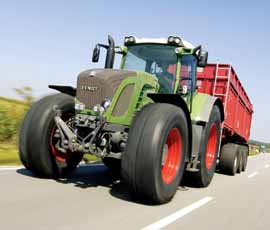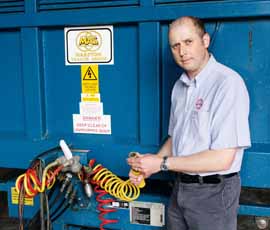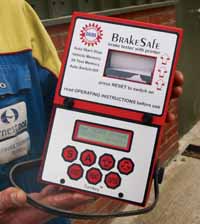Danes come to Essex for trailer brake know-how

With a new European Directive on trailer brakes in the pipeline, farmers and governments across the EU are readying themselves for stiffer regulations.
Britain (like Germany) is in the vanguard of brake testing, so it was no surprise when a group of farmers and contractors from Denmark trekked to the New Holland plant at Basildon for a trailer brake demo held by British Agricultural and Garden Machinery Association (BAGMA), brake test guru Adam Wyatt (pictured below).
The visitors hope to encourage the Danish government to introduce a voluntary trailer brake test which would allow them to travel at higher speeds (currently pegged at 30kph) and carry more weight.
The Danish government currently bans 50kph boxes but allows a 48t gross train weight, 3.3m vehicle width and 22m max length. However farmers are encountering more problems as they try to move ever-longer combine header trailers around the roads.
BAGMA is playing a role abroad in other ways too. It is currently training its Belgian counterparts, and is due to present a demonstration of the equipment to the Dutch government.
 Back in the UK, discussions continue on the thorny subject of increasing the permitted speed and weight of tractors. Changes to the 25-year-old legislation are long overdue, and farmers and manufacturers point out that the rules are trailing well behind the developments in tractor and trailer engineering.
Back in the UK, discussions continue on the thorny subject of increasing the permitted speed and weight of tractors. Changes to the 25-year-old legislation are long overdue, and farmers and manufacturers point out that the rules are trailing well behind the developments in tractor and trailer engineering.
Trailers – could do better
With some tractors now capable of speeds of 75kph (46mph), there’s increasing pressure on trailer manufacturers and owners to make sure their braking systems actually work.
BAGMA’s brake tests, carried out through local dealers, give owners the chance not only to establish brake efficiency but also to get advice on how to upgrade their existing machines to meet the standards required.
The performance of many trailers’ brakes is startlingly poor. Of the 140 hydraulically-braked trailer systems put forward for testing 85% failed, and of those a worrying 24% had no brakes at all.
 Air brakes fared even worse with 88% failing to reach the minimum braking efficiency of 45% for a commercial specification trailer and 10% having no brakes at all.
Air brakes fared even worse with 88% failing to reach the minimum braking efficiency of 45% for a commercial specification trailer and 10% having no brakes at all.
According to Mr Wyatt there’s one major problem with the current system – the tests are voluntary. Because certification is not imposed, farmers aren’t always willing to fork out for a test which can cost between £60-120 per trailer.
Equally, trailer makers have found it difficult to equip machines to top-spec levels while at the same time keeping costs competitive.
“There are some commercial spec trailers being produced with large brakes but only 20mm rams and ¼ in hosing which often causes brakes to glaze,” says Mr. Wyatt
“Upgrading to 35mm diameter rams might only cost £200 per trailer but makes a major difference to brake capacity.”
Mr Wyatt says farmers have a duty of care to ensure the safety of their employees and other road users. Part of that is making sure trailers are kept up to standard, something which is often unintentionally overlooked, with the usual suspects being a lack of maintenance and adjustment.
“How do you know your machines comply with the standards if they haven’t been tested?” asks Mr Wyatt.
“The process only takes half and hour and allows a farmer to keep complete records on the condition of all the trailers.”
The damage that can be caused by poor trailer brakes could be anything from tractor brake pad replacement to a full back-end rebuild if brake disc residue manages to get into transmission oil. That can lead to an eye-watering £5,000 bill, so it’s in the owners’ interest to keep them working.
Basic changes to the set-up and coupling can make a substantial difference to braking efficiency.
Upgrades include fitting a larger 35mm ram and increasing hose size to ½in which has been shown to increase brake efficiency from 18% to 32%. Simply lubricating the brake actuator shaft can increase braking efficiency by 3-8%.
Load sensing units which provide more pressure to the rams as the trailer increases in weight can also be retro-fitted on both hydraulic and air systems, for a reasonable-sounding £400.
Even the angle of the trailer can influence the effectiveness of its brakes. “Raising the front of the trailer just eight inches can make as much as 33% difference in brake efficiency. It may just be a case of inflating the tractor tyres to the correct pressure for roadwork or adjusting the sprung drawbar if the trailer has one,” suggests Mr Wyatt.
Currently almost all manufacturers are offering a brake testing service through BAGMA trained technicians including Case IH, New Holland, MF, Valtra, Fendt, Challenger and McCormick. John Deere and Claas offer their own services.

